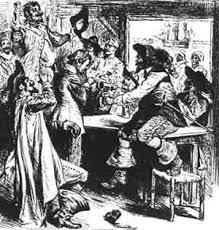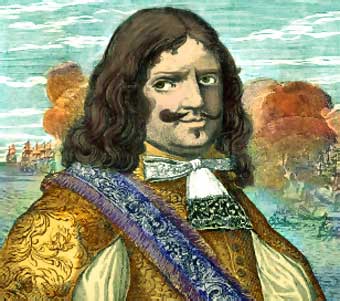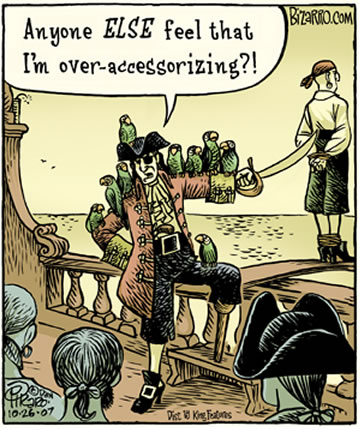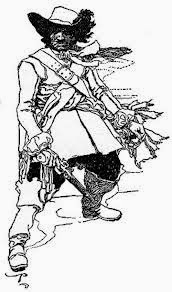Port Royal, Jamaica, has a name that sounds like aristocracy and order. In the Pirates of the Caribbean movies, it is portrayed as the seat of government, home port to two large naval ships, and on-shore haven to Commodore James Norrington, arch enemy of pirates.

The facts are quite different.
Jamaica started out as a Spanish colony, discovered on Columbus’ second voyage, in 1494. He named the island Santiago (Saint James) but the Spanish name was never used. Instead the island was referred to by the native, Arawak, name Xaymaca. This was corrupted into the current “Jamaica.”
Because there was no gold on the island, the Spanish never used it as more than a staging point from which to conquer other lands. Then, in 1655, England sent a fleet of ships to the Caribbean to capture the island of Hispaniola (now Haiti and the Dominican Republic).

But this island was too well defended. Unwilling to go home empty-handed, the fleet’s commanders captured a different island – Jamaica. England was anxious for any foothold in the Caribbean, and the island’s central location and wide, protected natural harbor offered a prime location for trading. England built 3 forts and constructed a city, which was first called Point Cagway, and later Port Royal.
The only problem was that there were no navy ships available to protect the new colony from the Spanish. England had only 3 frigates in the entire Caribbean. So the island’s governor turned to another source of firepower. He offered pirates, buccaneers and privateers safe harbor and free trading in return for defending his colony should the Spanish ever attack.
Ships flocked to the island, and what had been a sleepy village was soon a roaring boom town. The pirates brought in gold and captured booty, and merchants – those not too proud to deal with outlaws as long as the profits were good - arrived in droves. Dozens of taverns and brothels sprang up. In a very short time, Port Royal was known as “The wickedest city on earth.”
 Port Royal soon became a trading center for slaves, sugar and raw materials such as wood. Smuggling boomed. The Spanish ports were officially closed to foreigners, but at the same time they represented a huge potential market for African slaves and goods manufactured in Europe. Jamaica, and Port Royal, was well placed to fill that market.
Port Royal soon became a trading center for slaves, sugar and raw materials such as wood. Smuggling boomed. The Spanish ports were officially closed to foreigners, but at the same time they represented a huge potential market for African slaves and goods manufactured in Europe. Jamaica, and Port Royal, was well placed to fill that market.
Something else was unique in Port Royal. Because it was a rough-and-tumble outpost, populated by sailors from all over the world, the city had a loose attitude towards religions. In a world where religion was a national affair, a matter for alliances and wars, Port Royal was soon home to Anglicans, Jews, Quakers, Puritans, Presbyterians and Catholics.
In 1668 Henry Morgan used the city as the launching point for his invasion of the Spanish city of Portobello, an endeavor that brought over 200,000 pieces of eight into the economy of Port Royal. When the English Navy belatedly sent the warship HMS Oxford to protect Jamaica, the Governor gave the ship to Morgan out of gratitude for his services.
Morgan made Jamaica his home base, launching attack after attack against the Spanish and nearly starting a war. But the money he sent home to England got him out of a world of trouble. He was eventually made lieutenant governor of the island, and spent the rest of his life haunting the dockside taverns and recounting the exploits of his younger days.
When he died on August 25th of 1688, all the ships in the harbor fired their guns in honor, and his body was brought on a gun carriage to St. Peter’s church, where he lay in state. He was later interred in a nearby cemetery.
By this time, the city was as large and important a town as Boston and many of the local merchants were quite wealthy. It seemed destined to become one of the leading cities in the New World. Then fate intervened.
At 11:43 am, on June 7th, 1692, Jamaica was hit by a devastating earthquake, followed by a tsunami. Most of the city sank beneath the ocean, killing 2,000 people almost instantly. 3,000 more died in the following days of injury and disease.
Looting broke out, and all order broke down for a while. Even the dead were stripped of valuables. Some of the bodies were hacked apart to remove jewelry. Many said it was the wrath of God, punishment for the inhabitants’ sinful ways.
Port Royal tried to rise, but was hit again by a serious fire in 1707. The capital of Jamaica was moved to Spanish Towne, and Port Royal became a sleepy village once again.
It had two more parts to play in the story of piracy. The pirate captains Jack Rackham and Charles Vane were both tried here, in 1720 and 1721 respectively, and their bodies were displayed on nearby Gallows Point.

Today, with continued interest in pirates, Port Royal is undergoing a pirate-themed renovation. Because the city sank so quickly and lay undisturbed for so long, the remains are a treasure-trove of archaeological artifacts. Pipes, swords, and rum bottles are brought up regularly. Researchers and treasure hunters dive in the bay. For a price, tourists can go down, too and keep whatever they find.

Perhaps you, too, will vacation in Port Royal and take a turn at diving. Who knows what you might bring up?
The facts are quite different.
Jamaica started out as a Spanish colony, discovered on Columbus’ second voyage, in 1494. He named the island Santiago (Saint James) but the Spanish name was never used. Instead the island was referred to by the native, Arawak, name Xaymaca. This was corrupted into the current “Jamaica.”
Because there was no gold on the island, the Spanish never used it as more than a staging point from which to conquer other lands. Then, in 1655, England sent a fleet of ships to the Caribbean to capture the island of Hispaniola (now Haiti and the Dominican Republic).
But this island was too well defended. Unwilling to go home empty-handed, the fleet’s commanders captured a different island – Jamaica. England was anxious for any foothold in the Caribbean, and the island’s central location and wide, protected natural harbor offered a prime location for trading. England built 3 forts and constructed a city, which was first called Point Cagway, and later Port Royal.
The only problem was that there were no navy ships available to protect the new colony from the Spanish. England had only 3 frigates in the entire Caribbean. So the island’s governor turned to another source of firepower. He offered pirates, buccaneers and privateers safe harbor and free trading in return for defending his colony should the Spanish ever attack.
Ships flocked to the island, and what had been a sleepy village was soon a roaring boom town. The pirates brought in gold and captured booty, and merchants – those not too proud to deal with outlaws as long as the profits were good - arrived in droves. Dozens of taverns and brothels sprang up. In a very short time, Port Royal was known as “The wickedest city on earth.”
Something else was unique in Port Royal. Because it was a rough-and-tumble outpost, populated by sailors from all over the world, the city had a loose attitude towards religions. In a world where religion was a national affair, a matter for alliances and wars, Port Royal was soon home to Anglicans, Jews, Quakers, Puritans, Presbyterians and Catholics.
In 1668 Henry Morgan used the city as the launching point for his invasion of the Spanish city of Portobello, an endeavor that brought over 200,000 pieces of eight into the economy of Port Royal. When the English Navy belatedly sent the warship HMS Oxford to protect Jamaica, the Governor gave the ship to Morgan out of gratitude for his services.
When he died on August 25th of 1688, all the ships in the harbor fired their guns in honor, and his body was brought on a gun carriage to St. Peter’s church, where he lay in state. He was later interred in a nearby cemetery.
At 11:43 am, on June 7th, 1692, Jamaica was hit by a devastating earthquake, followed by a tsunami. Most of the city sank beneath the ocean, killing 2,000 people almost instantly. 3,000 more died in the following days of injury and disease.
Port Royal tried to rise, but was hit again by a serious fire in 1707. The capital of Jamaica was moved to Spanish Towne, and Port Royal became a sleepy village once again.
It had two more parts to play in the story of piracy. The pirate captains Jack Rackham and Charles Vane were both tried here, in 1720 and 1721 respectively, and their bodies were displayed on nearby Gallows Point.
Today, with continued interest in pirates, Port Royal is undergoing a pirate-themed renovation. Because the city sank so quickly and lay undisturbed for so long, the remains are a treasure-trove of archaeological artifacts. Pipes, swords, and rum bottles are brought up regularly. Researchers and treasure hunters dive in the bay. For a price, tourists can go down, too and keep whatever they find.
Perhaps you, too, will vacation in Port Royal and take a turn at diving. Who knows what you might bring up?
















